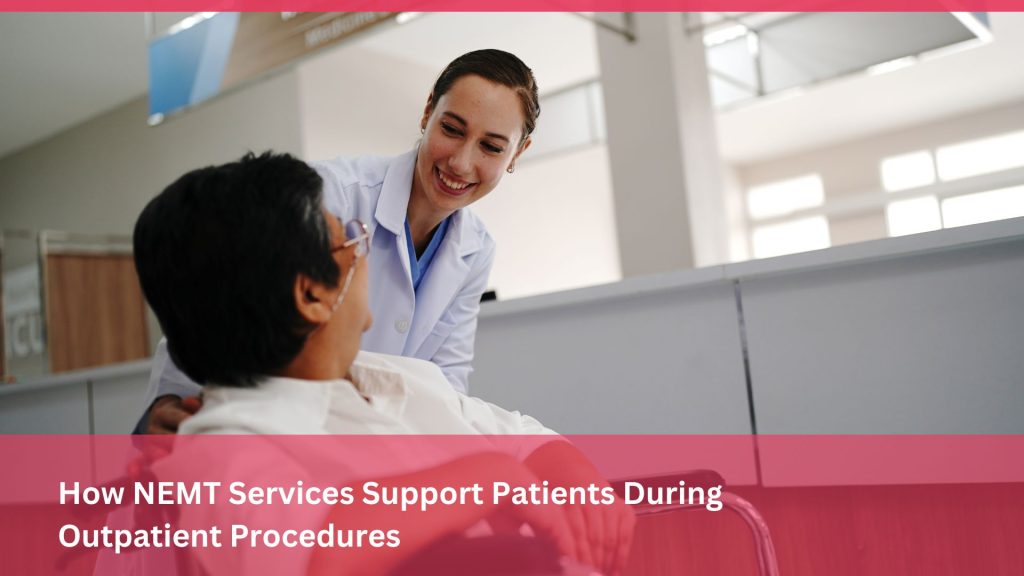New at Safr Care
How NEMT Services Support Patients During Outpatient Procedures

How NEMT Services Support Patients During Outpatient Procedures
Outpatient procedures, ranging from minor surgeries to routine diagnostic tests, are a vital part of modern healthcare. While these interventions often take place in ambulatory care centers or clinics, they still pose unique challenges for patients who must travel to and from appointments. Non-Emergency Medical Transportation (NEMT) services play a critical role in helping patients overcome these obstacles, ensuring safe, comfortable, and reliable transportation before and after outpatient procedures. This article explores how NEMT services enhance the outpatient experience, support patient well-being, and improve overall healthcare outcomes.
Why Patients Need NEMT Support for Outpatient Procedures
Although outpatient procedures are typically less invasive than inpatient surgeries, patients may still face difficulties with transportation. Factors contributing to these challenges include:
- Mobility Limitations: Patients with conditions affecting mobility may struggle to drive or use public transportation.
- Post-Procedure Restrictions: Some procedures involve sedation or anesthesia, making it unsafe or impossible for patients to drive themselves afterward.
- Lack of Personal Transportation: Individuals without personal vehicles or reliable rides may find it hard to reach outpatient facilities, particularly if they live in rural or underserved areas.
- Chronic Conditions: Patients managing ongoing health issues may require specialized transport that accommodates medical equipment, oxygen, or wheelchairs.
NEMT services address these barriers, ensuring patients receive timely, stress-free transportation that supports their health and comfort.
Key Ways NEMT Services Assist with Outpatient Care
1. Safe and Reliable Transportation
NEMT providers prioritize safety, offering trained drivers and well-maintained vehicles. This ensures that patients arrive at their outpatient procedure appointments on time and return home securely, even if they are experiencing discomfort or drowsiness from sedation.
2. Accommodations for Mobility Aids and Equipment
Whether a patient relies on a wheelchair, walker, or portable medical device, NEMT vehicles can be equipped to handle these needs. Drivers are trained to assist with boarding, disembarking, and securing equipment, so patients can focus on their health rather than logistical challenges.
3. Comfort and Compassion
Undergoing an outpatient procedure can be anxiety-inducing. Compassionate NEMT staff help ease patients’ concerns by maintaining a calm, reassuring presence. They may adjust vehicle temperature, provide a pillow or blanket, and ensure a supportive environment, improving the patient’s overall experience.
4. Specialized Assistance for Post-Procedure Needs
After outpatient procedures, patients may feel groggy or uncomfortable. NEMT drivers trained in patient care can help monitor for signs of distress, assist with seatbelts, and ensure patients arrive home safely. This attentive approach is particularly beneficial after procedures involving sedation, where patients must refrain from operating vehicles or heavy machinery for a set period.
Benefits for Patients, Providers, and the Healthcare System
NEMT services deliver advantages not only to patients but also to providers and the broader healthcare ecosystem:
- Reduced Missed Appointments: Reliable transportation encourages patients to attend their scheduled procedures, improving adherence to treatment plans.
- Improved Patient Outcomes: Ensuring timely outpatient care can catch health issues early, enhance recovery, and prevent complications.
- Increased Patient Satisfaction: A smooth, supportive transportation experience helps patients feel valued and respected, contributing to overall patient satisfaction.
- Healthcare Efficiency: Minimizing appointment cancellations and delays aids in optimizing clinical schedules and resource allocation.
Collaborating with Quality NEMT Providers
Choosing a reputable NEMT provider is essential. Companies like SafrCare exemplify a commitment to patient-centered service, offering:
- Trained Staff: Skilled drivers familiar with assisting patients after outpatient procedures.
- Fleet Variety: Vehicle options that accommodate different mobility and medical equipment needs.
- Flexible Scheduling: The ability to arrange transportation that aligns with procedure times, follow-up visits, and last-minute changes.
- Excellent Communication: Clear instructions, timely updates, and responsive support help patients and caregivers stay informed and at ease.
By partnering with a reliable NEMT provider, patients can access consistent, high-quality transportation that supports their outpatient care journey.
Tips for Patients and Caregivers
To make the most of NEMT services during outpatient procedures, consider the following:
- Plan Ahead: Book transportation well before the procedure date, and confirm pick-up and drop-off times.
- Share Information: Inform the NEMT provider about any special requirements, such as wheelchairs, oxygen tanks, or language preferences.
- Follow Medical Guidance: If doctors advise against driving post-procedure, rely on NEMT services to ensure a safe return home.
- Keep Contact Numbers Handy: Have the provider’s phone number and appointment details easily accessible in case of changes or delays.
Conclusion
NEMT services play a pivotal role in supporting patients through outpatient procedures by offering safe, reliable, and compassionate transportation. By reducing logistical hurdles and alleviating patient stress, these services empower individuals to access the care they need while maintaining their comfort and dignity.
As healthcare delivery continues to emphasize convenience, patient-centered care, and preventive measures, NEMT services stand out as a valuable resource. With the support of skilled, patient-focused providers like SafrCare, patients can confidently navigate their outpatient journeys, focusing on healing, recovery, and overall well-being.
